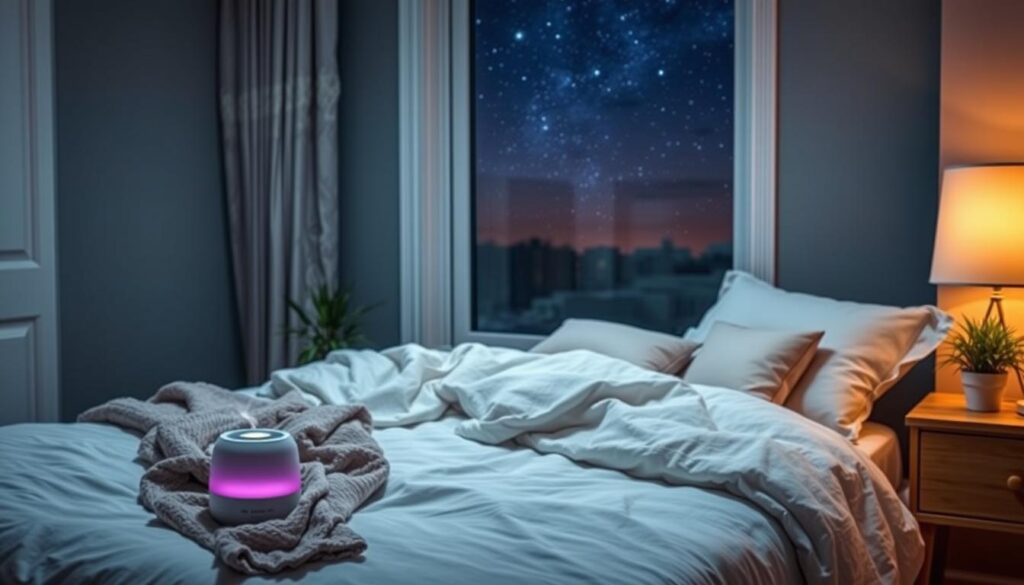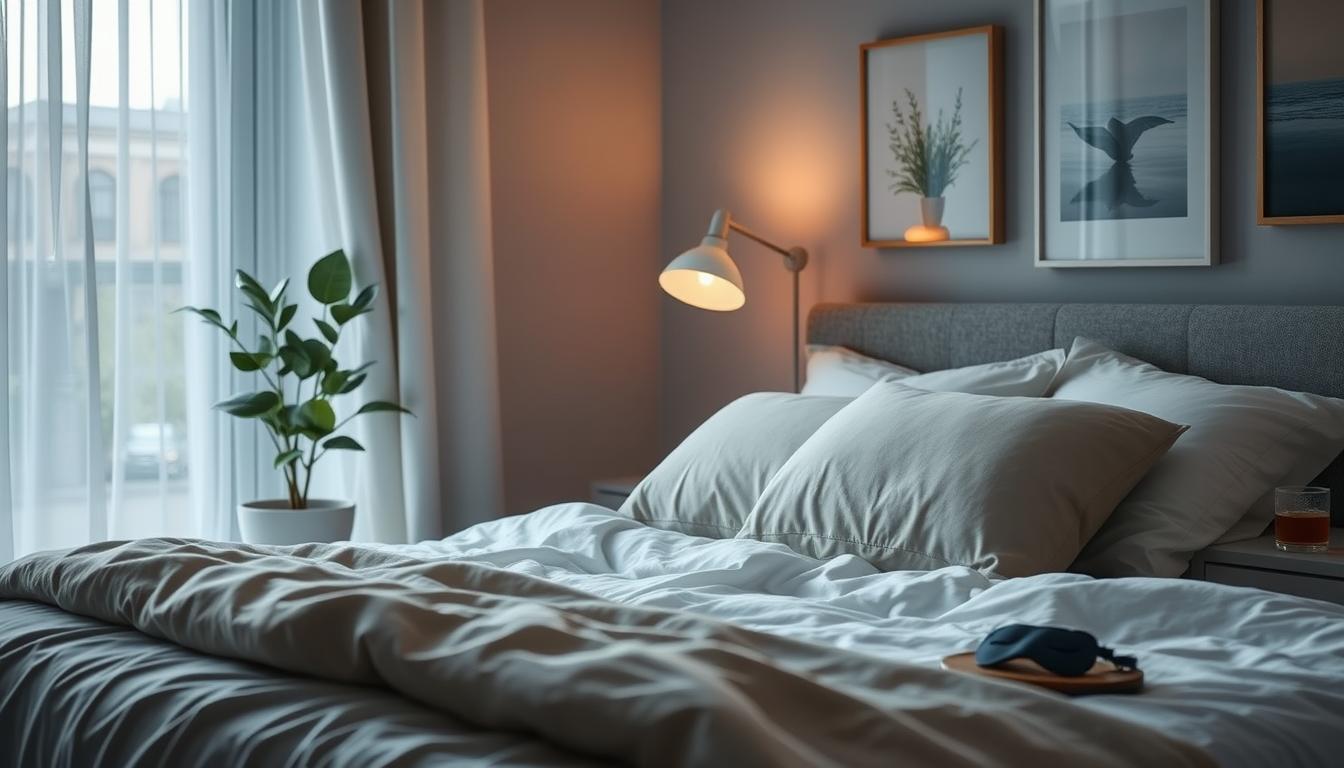Getting a good night’s sleep is crucial for our overall health and well-being, yet many people struggle to achieve the quality rest they need. Fortunately, there are various strategies you can implement to enhance your sleep quality and wake up feeling refreshed and energized. This comprehensive guide will explore 15 expert-recommended ways to improve your sleep hygiene and establish a restful bedtime routine.
Key Takeaways
- Optimize your sleep environment for comfort and relaxation
- Establish a consistent sleep schedule and pre-bedtime routine
- Incorporate stress-reducing techniques and relaxation practices
- Manage your exposure to blue light and technology before bed
- Explore natural supplements and lifestyle changes that promote better sleep
Understanding Sleep Quality and Its Impact on Health
Achieving high-quality sleep is essential for our overall well-being. Sleep plays a crucial role in regulating our body’s internal functions, replenishing our energy, and maintaining cognitive abilities. Understanding the science behind sleep cycles and the health consequences of poor sleep can help us prioritize sleep quality and make informed choices for better rest.
The Science Behind Sleep Cycles
Our sleep patterns are governed by a complex interplay of physiological and neurological processes. Throughout the night, we cycle through different stages of sleep cycles, including light sleep, deep sleep, and REM (Rapid Eye Movement) sleep. Each stage serves a unique purpose, from memory consolidation to tissue repair and hormone regulation. By recognizing the importance of these sleep stages, we can better understand how to optimize our sleep quality.
Health Consequences of Poor Sleep
- Impaired cognitive function: Lack of quality sleep can lead to difficulty concentrating, poor decision-making, and reduced productivity.
- Weakened immune system: Sufficient sleep is essential for the proper functioning of our immune system, leaving us more susceptible to illness when sleep is disrupted.
- Increased risk of chronic diseases: Chronic poor sleep quality has been linked to an increased risk of conditions such as diabetes, heart disease, and obesity.
Quality vs. Quantity: What Matters More
While the overall duration of sleep is important, the quality of sleep is often a more significant factor in determining its benefits. Achieving a balance between the right amount of sleep and the right sleep stages can have a profound impact on our physical and mental well-being. Prioritizing sleep quality over simply logging more hours in bed can lead to more rejuvenating and restorative rest.
“Quality sleep is not just about the number of hours you spend in bed, but rather the depth and restfulness of your sleep.”
| Sleep Metric | Ideal Range | Potential Consequences of Deviation |
|---|---|---|
| Total Sleep Time | 7-9 hours per night | Fatigue, cognitive impairment, increased risk of chronic diseases |
| Sleep Efficiency | 85-90% | Fragmented sleep, difficulty falling and staying asleep |
| REM Sleep | 20-25% of total sleep time | Impaired memory, mood disturbances, decreased creativity |
By understanding the science behind sleep cycles and the impact of sleep quality on our health, we can make more informed choices to improve our overall well-being and ensure that we wake up feeling refreshed and energized.
Creating the Perfect Sleep Environment
Creating a sleep-conducive environment in your bedroom is crucial for achieving quality sleep. The sleep environment, which encompasses factors like temperature, lighting, noise levels, and bedding, can have a profound impact on your ability to fall asleep and stay asleep. By optimizing your bedroom setup and sleep hygiene, you can unlock the full restorative potential of your sleep.
Temperature and Lighting
Maintaining an ideal bedroom temperature, typically between 65°F and 70°F, can significantly improve sleep quality. Additionally, minimizing exposure to bright lights, especially blue-wavelength light from electronic devices, can help regulate your body’s natural sleep-wake cycle.
Noise and Soundproofing
Reducing ambient noise levels in your bedroom can create a more soothing and undisturbed sleep environment. Consider using soundproofing techniques, such as adding curtains or rugs, to absorb echoes and minimize external sounds.
Bedding and Mattress
The right bedding and mattress can make a tremendous difference in your sleep experience. Invest in a comfortable, supportive mattress and high-quality bedding that aligns with your personal preferences and sleep needs.
“The quality of your sleep environment can have a significant impact on the quality of your sleep.”
By optimizing your sleep environment, you can create a sanctuary that promotes relaxation, reduces sleep disruptions, and sets the stage for a restorative night’s rest. Remember, the journey to better sleep starts with the simple yet impactful adjustments you make to your bedroom setup and sleep hygiene.
Ways to Improve Sleep Quality Through Daily Habits
Achieving quality sleep is not just about the hours spent in bed. Your daily habits, from morning routines to evening practices, can significantly impact the quality of your rest. By making a few simple adjustments to your daily life, you can dramatically improve your sleep quality and overall well-being.
Morning Routines for Better Sleep
Start your day right with a morning routine that sets the tone for better sleep. Exposing yourself to natural light early in the day can help regulate your body’s circadian rhythms, while a brisk walk or light exercise can energize you without overstimulating your system. Avoid hitting the snooze button, as this can disrupt your sleep-wake cycle.
Daytime Behaviors That Affect Sleep
- Limit caffeine intake, especially in the afternoon and evening.
- Stay hydrated throughout the day to support your body’s natural functions.
- Take regular breaks and find ways to manage stress, as it can significantly impact sleep quality.
Evening Practices for Quality Rest
Create a relaxing bedtime routine that cues your body to wind down. Avoid screens and bright lights for at least an hour before bed, as the blue light can disrupt your natural melatonin production. Instead, engage in calming activities like reading, light stretching, or meditation to prepare your mind and body for a restful night’s sleep.
“Establishing consistent daily habits is key to improving sleep quality and overall health.”
By incorporating these daily habits, you can take proactive steps to enhance your sleep quality and experience the numerous benefits of restorative rest. Remember, small changes can lead to significant improvements in your sleep and overall well-being.
The Role of Diet in Sleep Quality
When it comes to achieving quality sleep, your diet plays a crucial role. The foods and beverages you consume can have a significant impact on your sleep patterns, either promoting restful slumber or disrupting your sleep-wake cycle. Understanding the nutritional impact on sleep is key to optimizing your nightly rest.
One of the primary ways diet influences sleep is through the production of sleep-regulating hormones like melatonin and serotonin. Certain foods, such as tart cherries, walnuts, and fatty fish, are rich in nutrients that support the natural synthesis of these hormones, helping to regulate your body’s sleep-wake cycle.
| Food | Nutrient | Impact on Sleep |
|---|---|---|
| Tart Cherries | Melatonin | Helps regulate the sleep-wake cycle |
| Walnuts | Tryptophan, Melatonin | Promotes relaxation and better sleep |
| Fatty Fish (Salmon, Tuna) | Omega-3 Fatty Acids | Reduces inflammation and supports sleep quality |
On the other hand, certain foods and beverages can have a negative impact on sleep. Consuming large amounts of caffeine, sugar, or alcohol too close to bedtime can disrupt your body’s natural sleep-wake cycle, leading to difficulty falling asleep or poor quality of rest.
To optimize your diet for better sleep, focus on incorporating sleep-promoting foods, limiting consumption of sleep-disruptive items, and maintaining a consistent meal schedule. By making strategic dietary choices, you can take a significant step towards achieving the restful slumber your body craves.

Establishing a Consistent Bedtime Routine
Getting quality sleep is essential for our overall health and well-being. One of the most effective ways to improve sleep quality is by establishing a consistent bedtime routine. This routine helps signal to your body that it’s time to wind down and prepare for a restful night’s sleep.
Pre-Sleep Relaxation Techniques
Incorporating relaxation techniques into your bedtime routine can significantly improve the quality of your sleep. Some effective pre-sleep relaxation methods include:
- Gentle stretching or light yoga
- Deep breathing exercises
- Meditation or mindfulness practices
- Listening to soothing music or nature sounds
These activities can help reduce stress, lower your heart rate, and create a calming environment for better sleep.
Timing Your Sleep Schedule
Maintaining a consistent sleep schedule, even on weekends, is crucial for regulating your body’s internal clock. Aim to go to bed and wake up at the same time every day, including weekends. This helps your body anticipate and adapt to your sleep-wake cycle, leading to better sleep quality and bedtime routine.
Weekend Sleep Habits
While it’s tempting to sleep in or stay up late on weekends, it’s important to maintain a consistent sleep schedule as much as possible. Significant variations in your sleep schedule can disrupt your body’s internal clock and make it harder to fall asleep on weeknights. Try to keep your weekend bedtime and wake-up time within an hour or two of your weekday schedule.
By establishing a consistent bedtime routine, incorporating relaxation techniques, and maintaining a regular sleep schedule, you can significantly improve the quality of your sleep and support your overall health and well-being.
Natural Sleep Supplements and Their Effects
If you’re struggling with sleep quality, you may have heard about the potential benefits of natural sleep supplements. These plant-based remedies have gained popularity as an alternative to traditional sleep aids, offering a more holistic approach to improving your rest. Let’s explore some of the most commonly used natural sleep supplements and their effects.
Melatonin: The Sleep Regulator
Melatonin is a hormone naturally produced by the body to regulate the sleep-wake cycle. Many people turn to melatonin supplements to help them fall asleep faster and enjoy more restful nights. Research suggests that melatonin can be particularly effective for people with jet lag or those who have difficulty falling asleep due to disruptions in their natural circadian rhythms.
Valerian Root: The Natural Sedative
Valerian root is another popular natural sleep aid. This herb has been used for centuries to promote relaxation and improve sleep quality. Studies have shown that valerian root can help reduce the time it takes to fall asleep and increase the quality of sleep, making it a viable option for those seeking a more natural approach to better sleep.
Magnesium: The Mineral for Relaxation
Magnesium is a mineral that plays a crucial role in the body’s sleep-wake cycle. Numerous studies have found that magnesium supplements can help improve sleep quality, particularly for individuals with magnesium deficiencies. Magnesium can also aid in reducing stress and promoting muscle relaxation, further enhancing your ability to fall and stay asleep.
| Supplement | Potential Benefits | Recommended Dosage |
|---|---|---|
| Melatonin | Regulates sleep-wake cycle, helps with jet lag, and promotes faster sleep onset | 0.5-5 mg before bedtime |
| Valerian Root | Reduces the time it takes to fall asleep and improves sleep quality | 300-900 mg 30-60 minutes before bed |
| Magnesium | Promotes relaxation, reduces stress, and supports healthy sleep-wake cycle | 300-500 mg before bedtime |
Remember, while these natural sleep supplements can be effective, it’s always best to consult with a healthcare professional before incorporating them into your sleep routine. They can provide personalized advice and ensure the supplements are safe and appropriate for your individual needs.

Exercise and Physical Activity for Better Sleep
Regular exercise and physical activity can have a profound impact on the quality of your sleep. By incorporating the right types of exercise at the optimal time, you can significantly improve your ability to fall asleep faster and experience more restful, rejuvenating slumber.
Best Time to Exercise for Sleep Quality
The timing of your exercise routine plays a crucial role in its effect on sleep quality. Experts recommend engaging in physical activity several hours before your desired bedtime. This allows your body temperature to rise during the workout and then gradually cool down, which helps facilitate the natural sleep-wake cycle.
Avoid intense exercise close to bedtime, as it can be stimulating and disrupt your ability to relax and fall asleep. Instead, aim to complete your workout at least 2-3 hours before your desired bedtime for the best results.
Types of Exercise That Promote Sleep
- Aerobic exercise: Activities like brisk walking, jogging, swimming, or cycling can help regulate your body’s circadian rhythms and improve sleep quality.
- Yoga and stretching: Gentle, relaxing forms of exercise like yoga and light stretching can help reduce stress and tension, promoting better sleep.
- Strength training: Resistance exercises that work the major muscle groups can contribute to improved sleep by reducing muscle tension and fatigue.
The key is to find a balance and incorporate a variety of exercises that you enjoy and that work best for your individual sleep needs. Consistency is also crucial, as regular physical activity over time can lead to significant improvements in sleep quality.
Remember, the relationship between exercise and sleep is a two-way street. Not only can exercise enhance your sleep, but quality sleep can also help you perform better during your workouts. By making exercise a priority and timing it right, you can unlock the full potential of physical activity for better sleep and overall health.
Managing Stress and Anxiety for Restful Sleep
Achieving quality sleep is not just about the quantity of hours we spend in bed. Stress and anxiety can be significant barriers to a good night’s rest. To combat this, it’s crucial to learn effective techniques for managing stress and anxiety, which can pave the way for more restful and rejuvenating sleep.
One powerful approach is the practice of mindfulness. By focusing on the present moment and cultivating a non-judgmental awareness of our thoughts and feelings, we can reduce the impact of stress and anxiety on our sleep patterns. Mindfulness-based techniques, such as meditation and deep breathing exercises, can help calm the mind and promote relaxation before bed.
Another effective strategy is cognitive-behavioral therapy for insomnia (CBT-I). This evidence-based approach helps individuals identify and modify negative thought patterns and behaviors that contribute to sleep difficulties. By addressing the underlying psychological factors that disrupt sleep, CBT-I can lead to long-term improvements in sleep quality and overall well-being.
In addition to these therapeutic methods, there are various lifestyle changes that can help manage stress and anxiety for better sleep. Regular exercise, a healthy diet, and practicing good sleep hygiene can all contribute to a more relaxed state of mind and body, setting the stage for more restful and rejuvenating sleep.
| Technique | Description | Benefits for Sleep |
|---|---|---|
| Mindfulness Meditation | A practice that involves focusing on the present moment and cultivating a non-judgmental awareness of thoughts and feelings. | Reduces stress and anxiety, promotes relaxation, and improves sleep quality. |
| Cognitive-Behavioral Therapy for Insomnia (CBT-I) | A structured approach that addresses the psychological factors contributing to sleep difficulties. | Helps individuals identify and modify negative thought patterns and behaviors, leading to long-term improvements in sleep. |
| Regular Exercise | Physical activity that can be incorporated into daily routines. | Reduces stress and anxiety, promotes relaxation, and improves overall sleep quality. |
By implementing a combination of these strategies, individuals can effectively manage stress and anxiety, paving the way for more restful and restorative sleep. Remember, taking a holistic approach to sleep health is key to achieving the sleep quality and quantity that our bodies and minds need to thrive.

Technology and Sleep: Finding the Right Balance
In our digital age, technology has become an integral part of our daily lives, but its impact on sleep quality is a growing concern. The constant connectivity and blue light exposure from our devices can disrupt our natural sleep-wake cycles, leading to poor sleep quality and adverse health effects. However, with the right strategies, we can find a balanced approach to technology and maintain healthy sleep habits.
Digital Wellness Tools
Numerous digital wellness tools have emerged to help individuals manage their technology usage and promote better sleep. These tools often include features such as:
- Screen time tracking and limits
- Blue light filters and night mode settings
- Bedtime reminders and wind-down routines
- Sleep tracking and analysis
By leveraging these tools, individuals can become more mindful of their digital habits and make informed choices to prioritize sleep and overall well-being.
Blue Light Management
One of the primary ways in which technology can disrupt sleep is through the exposure to blue light, which is emitted by many digital devices. This type of light can suppress the production of melatonin, a hormone that regulates the sleep-wake cycle. To mitigate the effects of blue light, individuals can:
- Use blue light-blocking glasses or screen filters to reduce exposure in the evenings
- Dim device brightness and enable night mode or dark mode settings
- Avoid using devices for at least 1-2 hours before bedtime
- Invest in LED light bulbs that emit less blue light in the bedroom
By implementing these blue light management strategies, individuals can create a more sleep-friendly environment and improve their overall sleep quality.
Remember, finding the right balance between technology and sleep is essential for maintaining a healthy lifestyle. By being mindful of your digital habits and implementing practical strategies, you can enjoy the benefits of technology while prioritizing quality rest and overall well-being.
Common Sleep Disorders and When to Seek Help
Struggling with persistent sleep issues? You’re not alone. Many people suffer from various sleep disorders that can significantly impact their overall sleep health and well-being. Understanding the common types of sleep disorders and recognizing when to seek professional help is crucial for finding effective solutions.
One of the most prevalent sleep disorders is insomnia, characterized by difficulty falling asleep, staying asleep, or waking up too early. Other common issues include sleep apnea, where breathing repeatedly stops and starts during sleep, and restless leg syndrome, which causes an urge to move the legs, disrupting sleep.
- Narcolepsy, a condition marked by excessive daytime sleepiness and sudden sleep attacks
- REM sleep behavior disorder, where individuals act out their dreams
- Circadian rhythm sleep-wake disorders, affecting the body’s internal clock
If you’re experiencing persistent sleep disorders that are interfering with your daily life, it’s best to seek professional help. A sleep specialist or healthcare provider can conduct a comprehensive evaluation, diagnose the underlying issue, and develop a personalized treatment plan to help you achieve quality, restorative sleep.
| Sleep Disorder | Symptoms | Treatment Options |
|---|---|---|
| Insomnia | Difficulty falling asleep, staying asleep, or waking up too early | Cognitive-behavioral therapy, sleep hygiene, medication (if necessary) |
| Sleep Apnea | Repeated breathing stops and starts during sleep | Continuous positive airway pressure (CPAP) therapy, oral appliances, surgery |
| Restless Leg Syndrome | Uncontrollable urge to move the legs, disrupting sleep | Medication, lifestyle changes, treatment of underlying conditions |
By addressing sleep disorders with the help of a healthcare professional, you can improve your overall sleep health and enjoy the numerous benefits of quality, restorative sleep.

“A good night’s sleep is essential for physical and mental well-being. Don’t hesitate to seek help if you’re struggling with persistent sleep issues.”
Sleep Tracking and Optimization Methods
In today’s digital age, sleep tracking has become an increasingly valuable tool for individuals seeking to enhance their sleep quality and overall well-being. With a wide array of sleep apps and devices available, it’s easier than ever to monitor your sleep patterns and identify areas for improvement.
Sleep Apps and Devices
From wearable fitness trackers to dedicated sleep-monitoring apps, the market is brimming with innovative technologies designed to provide insights into your sleep habits. These tools can track factors such as sleep duration, sleep stages, heart rate, and movement, offering a comprehensive understanding of your sleep quality. By leveraging these data-driven solutions, you can make informed decisions to optimize your sleep and achieve more restful nights.
Interpreting Sleep Data
Analyzing the data collected by your sleep tracking devices is crucial for deriving meaningful insights and implementing effective strategies for sleep optimization. Learning to interpret the metrics, such as sleep efficiency, sleep latency, and REM sleep duration, can help you identify patterns and areas that require attention. Armed with this knowledge, you can adjust your daily routines, sleep environment, and other factors to enhance your overall sleep quality and improve your physical and mental well-being.





